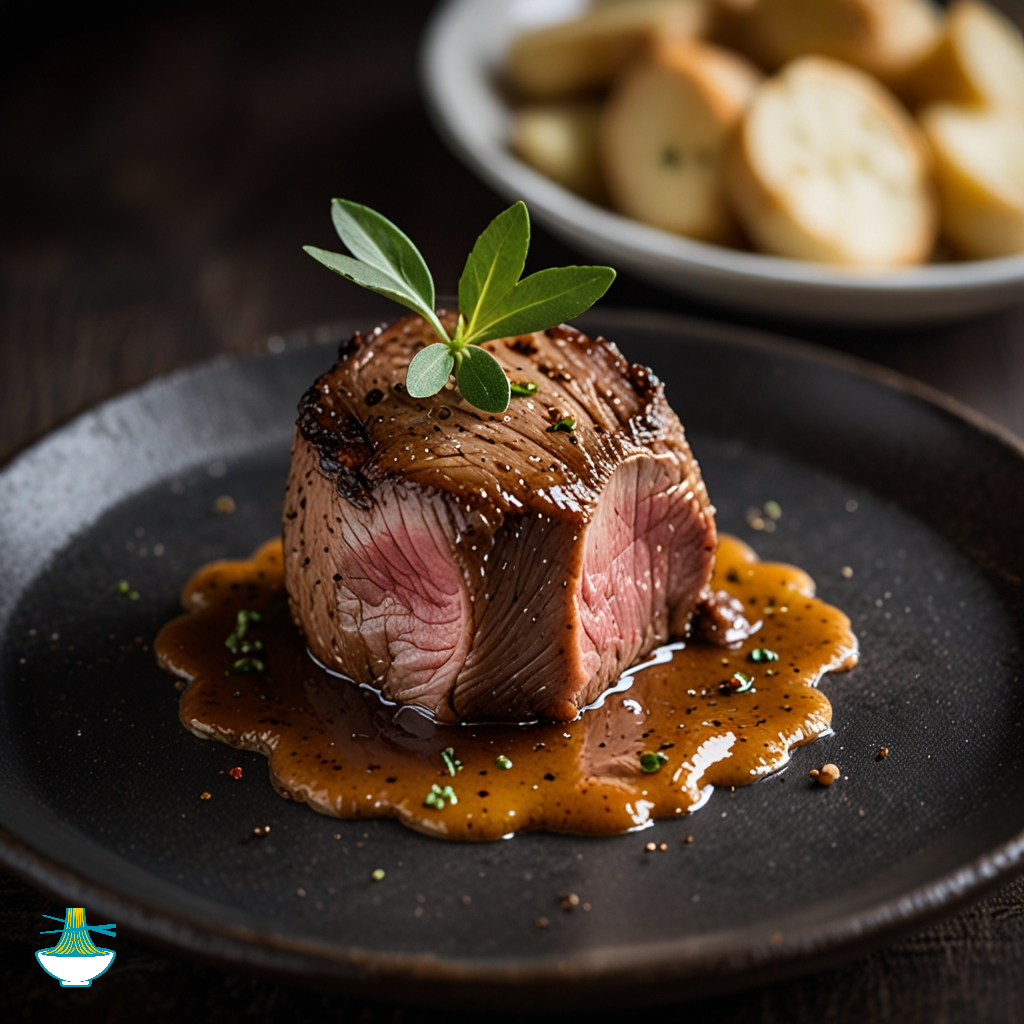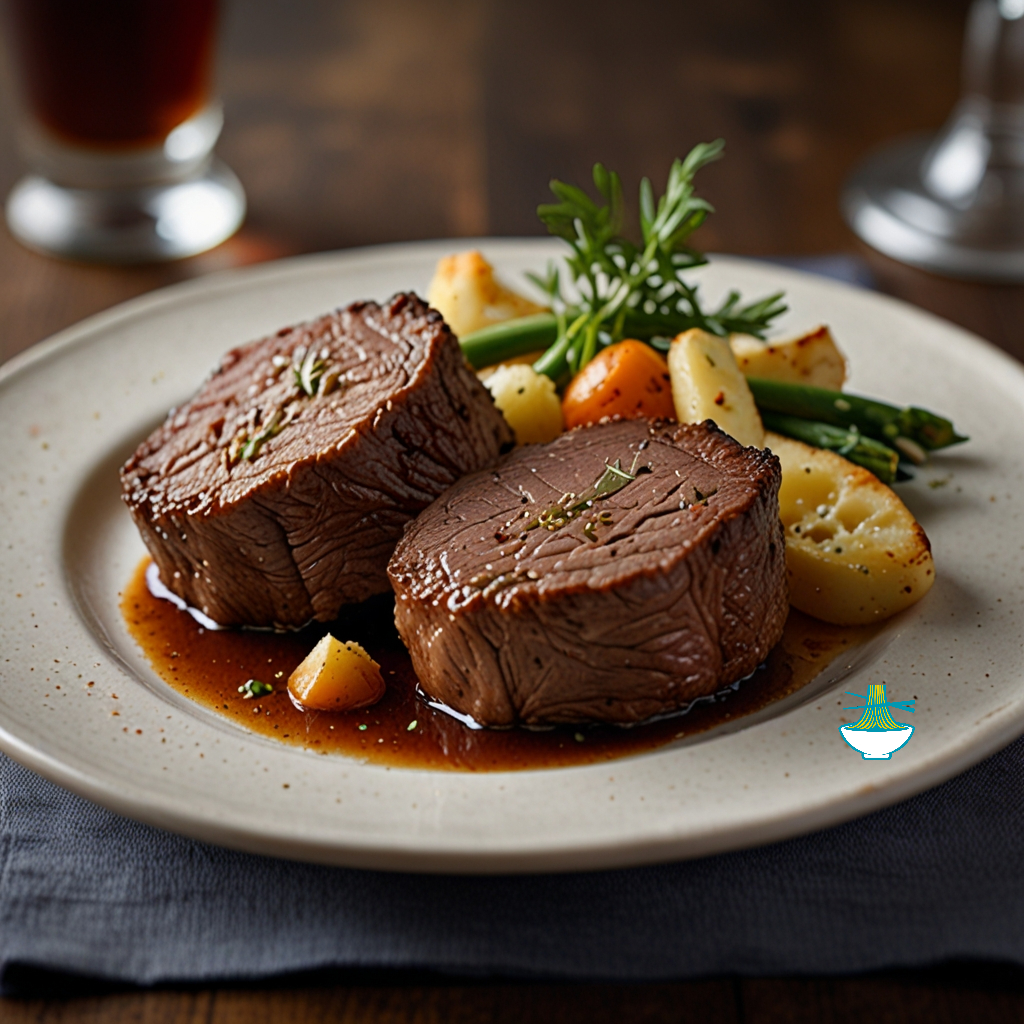Welsh lamb, celebrated for its exceptional quality and robust flavor, takes center stage in this timeless dish that pays homage to Wales' culinary heritage. This recipe showcases the succulent tenderness of Welsh lamb, expertly prepared to deliver a savory and gratifying dining experience.

The tradition of using lamb in Welsh cuisine spans centuries, deeply rooted in the region's rich agricultural history. Wales' lush pastures and natural grazing environments contribute to the distinctive taste and tenderness of Welsh lamb, making it a prized ingredient in traditional dishes. This recipe reflects the evolution of Welsh culinary expertise, blending heritage with modern tastes to preserve and celebrate this cultural icon.
Ingredients:
- 1 pound Welsh lamb chops or shoulder, bone-in
- 2 tablespoons olive oil
- Salt and pepper to taste
- Fresh rosemary sprigs (optional)
- 2 cloves garlic, minced
- 1 lemon, sliced

Method of Preparation:
1. Preheat your oven to 375°F (190°C).
2. Season the Welsh lamb chops or shoulder with salt, pepper, and minced garlic. Rub them with olive oil.
3. Place the lamb chops in a roasting pan or oven-safe dish. Arrange lemon slices and fresh rosemary sprigs on top if using.
4. Roast the lamb in the preheated oven for about 25-30 minutes for medium doneness, or adjust the cooking time according to your preference.
5. Remove the lamb from the oven and let it rest for a few minutes before serving.
6. Garnish with additional fresh rosemary if desired and enjoy your delicious Welsh lamb dish!
Nutrition Value:
1. Welsh Lamb Chops or Shoulder (1 pound, bone-in):
- Calories: Approximately 900 kcal
- Carbohydrates: 0 g
- Protein: Approximately 100 g
- Fat: Approximately 55 g (varies based on cut and fat content)
- Sodium: Varies, typically around 100-150 mg
- Cholesterol: Approximately 300 mg
- Vitamins and Minerals: Rich in Vitamin B12, Zinc, Iron, and Selenium
- Nutritional Benefits: High-quality protein source, rich in essential vitamins and minerals, particularly Vitamin B12 for energy production and iron for healthy blood cells.
2. Olive Oil (2 tablespoons):
- Calories: Approximately 240 kcal
- Carbohydrates: 0 g
- Protein: 0 g
- Fat: Approximately 28 g
- Sodium: 0 mg
- Cholesterol: 0 mg
- Vitamins and Minerals: Contains Vitamin E, Vitamin K, and healthy monounsaturated fats
- Nutritional Benefits: Source of heart-healthy fats, antioxidants, and anti-inflammatory properties.
3. Salt and Pepper (to taste):
- Calories: Negligible
- Carbohydrates: Negligible
- Protein: Negligible
- Fat: Negligible
- Sodium: Varies based on amount used, typically low in small quantities
- Cholesterol: 0 mg
- Vitamins and Minerals: No significant vitamins or minerals
- Nutritional Benefits: Enhances flavor but should be used in moderation due to sodium content.
4. Fresh Rosemary Sprigs (optional):
- Calories: Negligible
- Carbohydrates: Negligible
- Protein: Negligible
- Fat: Negligible
- Sodium: Negligible
- Cholesterol: 0 mg
- Vitamins and Minerals: Contains Vitamin C, Vitamin A, Calcium, and Iron
- Nutritional Benefits: Adds flavor and aroma, contains antioxidants and small amounts of essential vitamins and minerals.
5. Garlic (2 cloves, minced):
- Calories: Approximately 10 kcal
- Carbohydrates: Approximately 2 g
- Protein: Approximately 0.5 g
- Fat: Negligible
- Sodium: Negligible
- Cholesterol: 0 mg
- Vitamins and Minerals: Rich in Vitamin C, Vitamin B6, Manganese, and Allicin (beneficial compound)
- Nutritional Benefits: Supports immune health, has antibacterial properties, and adds flavor to dishes.
6. Lemon (1 sliced):
- Calories: Approximately 15 kcal
- Carbohydrates: Approximately 5 g
- Protein: Approximately 0.5 g
- Fat: Negligible
- Sodium: Negligible
- Cholesterol: 0 mg
- Vitamins and Minerals: High in Vitamin C, Potassium, and Fiber
- Nutritional Benefits: Provides Vitamin C for immune support, adds tangy flavor, and complements the lamb dish.
These nutritional values are approximate and can vary based on specific ingredients and preparation methods.


Comments